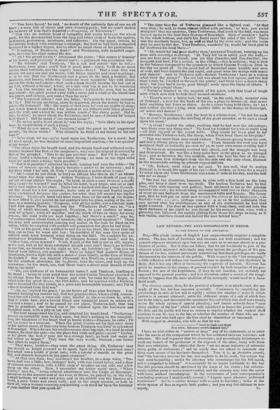LAW REFOUN—THE ANTI-MONOPOLISTS IN ERROR. TO THE EDI roR OF
TELE SPECTATOR.
STR,—The whole system of English Law unquestionably requires a complete reform. The fees both of barristers and attornies are truly exorbitant ; and the eeneral expenses attendant upon lawsuits are such as to amount alniat to a pro- hibition of justice. But it does not follow, that we are heedlessly to join in the clamour wiiich interested individuals may raise against the privileges of the gen- tlemen of fie bar, without previously ascertaining that those privileges are really detrimental to the interests of the public. With respect to the " bar monopoly," a little reflection will induce any reasonable man to question, if not absolutely to deny, that it has any effect in increasing the expenses of lawsuits. Custom has given its sanction to the charges at present exacted by both branches of the pro- fession ; the acts of the Legislature, if they do not sanction, are certainly not opposed to the general practice; and it is therefore rather a stretch of the imagi- nation to suppose that the mere abolition of the monopoly would tend to a bene- ficial result.
The obvious course, then, for the practical reformer, is to attack—not the mo- uoply of the bar, but law expenses generally. Commence by simplifying the .proceedings in suits at law and in equity ; reduce the number of ways in which justice is at present obtained ; settle the different stages of a suit at which fees are to be taken, and determine the maximum beyond which they shall not extend; revise the whole system of special pleading; and banish entirely those 'nice sharp quillets of the law" which are only calculated to harass the poorest suitor. Do this, and the public will have no reason to inquire whether the student shall continue to eat his way to the bar, or whether the number of those who are in- terested in and who feed upon the fees shall be diminished or increased.
With respect to Aristides, who tells us that he was "bred to dash and draw
Not wine, but more unwholesome law,"
I have no wish either to " answer or deny" any of his statements, or its enter into the merits of the comparison which he has instituted between barristers and attornies. His zeal is greaserthan his discretion ; and accordingly his:attempts to exalt one branch of the profession at the expense of the other, carry with them their own refutation. He admits that there "are too many instances of attornies being guilty of dishonesty ;" mid lie surely does riot intend to insinuate any thing more severe of the barriste7s themselves. True it is, as Aristides asserts, that "the barrister receives his fee, and neglects to do his work, but retains the cash notwithstanding • whilst the attorney who overcharges has his bill taxed, and is compelled to refund." it is certainly by no means creditable to the bar that this practice should be sanctioned by the usage of the courts ; but unfortu- nately neither party is under proper control, and the attorney may ruin the suitor with costs. withozd overcharging. In the correctness of your correspondent's concluding sentence I mostheartily concur : " Impose upon attornies additional restrictions." Act hi a similar Manner With respect to barristers ; strike at the whole system of fees as regards both parties ; and you may bid defiance to me..


















 Previous page
Previous page